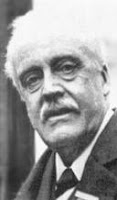(originally written around July, 1998)
[Despite my preference not to post anything of a political or religious nature on my blog, I found this recently and thought it appropriate for posting here at this time. It was a sort of book report I wrote for a former employer who had me read this large book. Of the many books I have read, I found this one to offer some very important information which actually could re-orient the world in a more hopeful direction. This is not an endorsement of Quigley's views as in many respects my opinions differ significantly from his; for example I happen to view certain things that are currently neglected or looked down upon as essential to life while other pursuits as either beneath contempt or a waste of one's time.]
Professor Carroll Quigley (1910-1977) was Bill Clinton's mentor at Georgetown. In 1966 he published his massive 1,310 page one volume history of the 20th century, Tragedy and Hope. It's mostly tragedy. I haven't gotten to the hope part yet except that he feels mankind was lucky to have survived the decade between 1953-1963, the height of the atomic bomb testing, etc.
Quigley has many surprises in this book. He says that communism is basically bunk and was used only as a pretense by some very unscrupulous people, to take power over certain nations and peoples. He says that Castro only embraced communism because he wanted to stay in power as long as possible, basically he's no better than Hitler, or any other dictator, all spoiled little boys. He says that worldwide financial empires have helped create situations which have led to war. He says that Great Britain isn't really a democracy at all. He says that Russia has always been a separate civilization from Western Europe and of course from America. He says that most American foreign policy has been mistaken. But then again he sees British foreign policy in most respects as more devious still. He views what happened to Germany as a tragedy that they largely brought on themselves, although he blames Britain as well. He has more sympathy for the French positions than most. He has high praise for Israel and for Japan. But he describes a lot of the world as part of what he calls the Pakistani-Peruvian axis. And the problem of the human race as Quigley sees it boils down to what he calls "outlook".
The Pakistani-Peruvian axis or the "Arabic" outlook as described by Carroll Quigley; "They were warlike, patriarchal, extremist, violent, intolerant and xenophobic" (Tragedy and Hope p. 1,116). Regarding the males raised in such societies, "usually they are spoiled, undisciplined, self-indulgent and unprincipled. Their whims are commands, their urges are laws." (Ibid. p. 1,118). The Pakistani-Peruvian axis runs from Pakistan westward through the Middle East (except Israel) and then across the Atlantic and includes Latin America, all of it from Mexico south. Pakistan and India just got the A bomb. Are you scared yet?
Contrast this with what Quigley says about the salaried middle classes of Japan, they are "ambitious, hard working, loyal, reliable, very adaptable to bureaucratic organization, scientific training and rationalizing processes, they are suspicious of ideologies or extremist doctrines of any kind." (Ibid. p 1,151). Quigley credits this outlook with the reason for Japan's success. He could have said the same about the post war Germans, whom he similarly characterizes, although among Europeans, Quigley says that the French are the most civilized.
Quigley is very clear about the necessity for good leadership and often finds it lacking. He admired Kennedy's handling of the Cuban missile crisis. Although I think it's probably fair to assume he'd prefer the Democrats to the Republicans, he is not in favor of redistribution of wealth or disturbing the power and prestige of the rich. He'd much rather see them take on a more constructive role than they usually do in the affairs of the rest of the world. He is very realistic.
I recommend this book to any serious student of contemporary history. They would soon discover a lot about economics and who really runs the world and why they have to. [Somewhat Swedish way to end a sentence, perhaps from my ancestors.]
FINIS











No comments:
Post a Comment